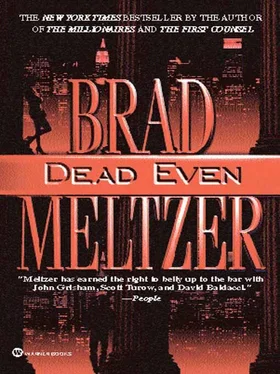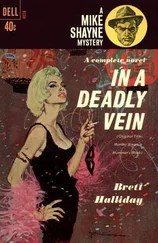“I’m taking care of the other cases.”
“Are you?” Conrad asked.
“I’m taking care of them,” she repeated. “If I can’t get a detective on this one, then I’ll go up there myself. Tomorrow morning, we’ll visit Claire Doniger and see what we can find.”
At one-thirty, Jared headed to “Chez Wayne,” the firm’s private dining room, for lunch. Every day, over three hundred employees swapped stories, shared gossip, and stuffed their faces in Chez Wayne’s enormous dining area.
Sitting alone in the back of the room, Jared ignored the conversations of his fellow employees. He dug into his minestrone soup, his mind focused on the case. Although he didn’t want to jinx himself with overconfidence, he was feeling good about his position. Sara still had almost nothing in terms of information, and her witnesses were becoming even more difficult to work with. Things were finally looking good for the defense, and best of all, his wife would be safe. So when he saw Marty Lubetsky enter the room, Jared waved his hand to get his boss’s attention.
Approaching Jared’s table with a tray of food, Lubetsky asked, “What’s got you so happy?”
“Nothing,” Jared said. “I was just thinking about the AmeriTex case from last week.”
“Jared, don’t fish for compliments.”
“I wasn’t.”
“Sure you weren’t,” Lubetsky said as he set his tray down and took a seat. “Don’t worry, though. I got copies of the motions. It was nice work.”
“Thanks,” Jared said.
“Now tell me about the Kozlow case. How do things look?”
“Good. Very good. I’m still hoping for a dismiss and seal, but I don’t think Sara’s going to go for it.”
“How’s her case?”
“It’s starting to crumble. By the end of the week, I think she’ll realize she’s stuck with a loser. And as she starts getting desperate, I’ve got a few more tricks.”
Resting against the doors of the subway car, Sara knew she was in trouble. From the moment she had taken the case, things had been sliding downhill. And no matter how hard she tried to climb back up, she could feel everything collapsing around her. As the train headed uptown, swarms of commuters packed in and Sara was pushed to the center of the car. With her back and shoulders pressed against strangers, she started to feel claustrophobic. She opened her coat to cool herself off, but the subway’s dry, chalky air caused her to break into an uncomfortable sweat. Closing her eyes, she tried to forget her fellow passengers. She tried to forget about Jared and Kozlow and Sunken Cheeks. And she tried not to think about her parents and her family and what would happen if she lost the case. But regardless of how hard she tried, and how many other things she could shut out, she couldn’t stop thinking about Pop. She’d never forget the fear in his eyes when he was wheeled into the hospital room. She had almost lost him, and he knew it. They had broken Pop. That was what she couldn’t shake, and unless she could prevent it, that was what they were going to do to her husband. Hold it together, she told herself, clutching the handle of her briefcase. It’ll be fine.
When the train reached Seventy-ninth Street, Sara shoved her way out of the car, desperate to get a breath of fresh air. As quickly as she could, she climbed up to the street and finally breathed a sigh of relief. On the walk home, she did her best to convince herself that everything would be okay – that she just needed to calm down and stay focused. But as she turned down her block, she heard someone behind her say, “Hey, Sara. What’s going on?”
Whirling around, Sara was relieved to see that it was just her upstairs neighbor, Joel Westman. “Sorry, Joel. I thought you were someone else.”
“Didn’t mean to scare you,” Joel said as he caught up to Sara. “Are you okay? You look sick.”
“I’m fine,” Sara said as they approached their building. “I think I’m just coming down with a cold. It’s been a rough week.”
“I know what you mean. Work can really get in the way of life,” Joel said. “Meanwhile, what happened to your briefcase?”
Looking down, Sara saw that someone had scratched the word Win into the side of her leather briefcase. Her heart skipped a beat. The threat was closer than she had known – indeed, so close it had been standing right next to her on the subway.
ON THURSDAY MORNING, SARA STOOD IN FRONT OF 201 East Eighty-second Street, anxiously waiting for Conrad and Guff to arrive. It had been over a week since she had spoken to Patty Harrison, and Sara knew that if she didn’t turn up something soon, she was going to have a hard time at trial. Staring at the old but pristine brownstone with potted plants on the doorstep and elegant tall windows, she couldn’t help but compare Claire Doniger’s home with her own. If Sara and Jared’s brownstone had Upper West Side character, Doniger’s had Upper East Side polish.
A cab pulled up and Guff and Conrad got out. “So this is where Kozlow picked the original fight?” Guff asked, staring up at the house.
“Take a good look at it,” Conrad said. “Try to imagine all the events as you know them and make sure they physically could work in this location.” Following Conrad’s instructions, the three coworkers stared at the building, trying to imagine Officer McCabe dragging Kozlow to Doniger’s door and Patty Harrison peering through her peephole.
“Okay, I’m done,” Guff said within thirty seconds. “Can we go inside now?”
“Shut up,” Conrad and Sara said simultaneously.
When they were done looking at the facade of the building, Conrad and Guff climbed the steps. “Hold on a second,” Sara said. “I want to talk to Harrison first. I haven’t been able to reach her since the grand jury.” She walked across the street to Harrison’s brownstone. Conrad and Guff followed.
As Sara rang Patty Harrison’s doorbell, Conrad put his finger over the peephole in the door.
“Why’re you doing that?” Sara asked.
“If she sees us and doesn’t want to speak to us, she’ll pretend she’s not home,” he whispered. “This way, she has to ask-”
“Who’s there?” a voice called out from behind the door. Conrad smiled.
“Ms. Harrison, it’s Sara Tate,” Sara said. “I just wanted to ask you a few questions.”
“No,” Harrison shot back. “Go away.”
“It’ll only take a minute,” Sara said. “I promise.”
“I said go away. I’m through talking to you.”
Confused, Sara looked at Conrad. “Ms. Harrison, is everything okay?” she asked.
There was no answer.
Banging on the door, Conrad said, “Ms. Harrison, this is Assistant District Attorney Conrad Moore. I’m giving you two options: You can open the door now, or we can come back with a search warrant, a carload of cops, and a battering ram. Either way we’re coming inside.”
“You don’t have probable cause for a search warrant,” Sara whispered.
“She doesn’t know that,” Conrad said under his breath. Then, raising his voice, he yelled, “Ms. Harrison, you have three seconds to make up your mind. After that, we’ll make sure the whole neighborhood knows you’re refusing to cooperate with the authorities. One … two …”
The dead bolts clicked and the door opened.
As Sara walked inside the cluttered house, Harrison had her back turned, with her head in her left hand. “Is everything okay?” Sara asked, touching her shoulder.
When Harrison turned around, Sara saw a deep purple bruise under her swollen left eye. The right side of her bottom lip was gashed and another bruise marked her right cheek. Harrison’s right arm, in a fiberglass cast, hung from a sling around her neck. As soon as Sara saw her, she felt nauseous. Harrison was no longer just a witness. She was now a victim.
Читать дальше












